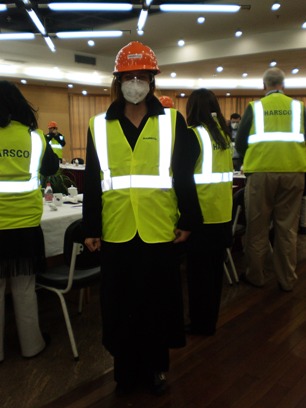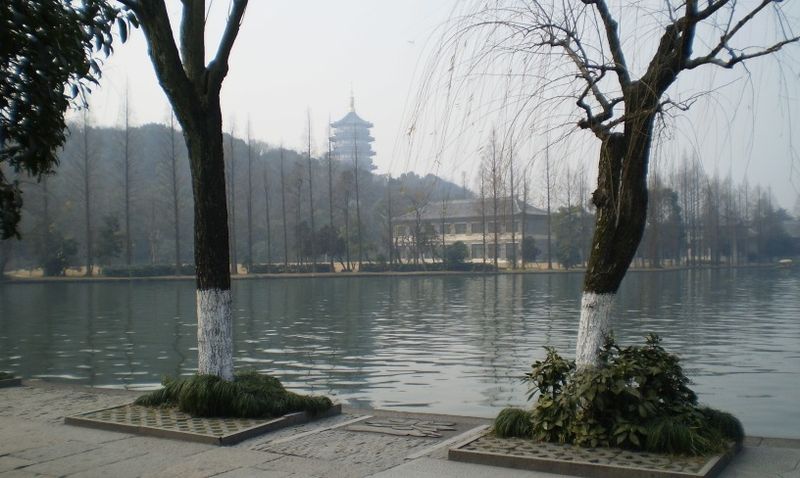Days 7 & 8: Hangzhou
Day 1 is here. The next two days were all about getting acclimated.
Days 2 & 3 are here. These days were pretty much spent as a tourist in Shanghai.
Days 4 & 5 are here. Lots of meetings with companies and other experts on Chinese business development.
Days 6 is here. Our journey to Hangzhou.
Day 7 (January 8)
We started the day with a visit to Alibaba.com. This company was founded in 1999 in Jack Ma’s apartment and now has 17,000 employees with offices across China as well as in London, California, Turkey and Southeast Asia. The company is listed on the Hong Kong Stock Exchange and at US $1.7 billion had one of the largest Internet IPOs since Google in 2004. The scale of this company is simply incredible; it’s like Ebay for business to business (B2B) transactions, like Amazon for business to consumer (B2C) transactions, like paypal but with an escrow function, like Google for affiliate marketing, and they run China Yahoo! They are also expanding into many other areas.
Alibaba’s goal is to enable the success of small and medium sized enterprises. Like in the USA, these smaller companies pay most of the tax and employee the majority of the people in China. Alibaba and its subsidiary companies help entrepreneurs and small businesses to establish and develop their e-business expertise. They provide extensive training to their members on how to reply to email, set up a website, etc. For now, all of their revenue is generated from membership fees and advertising. There are no costs to the users. Ebay had initially come to China but was largely nudged out by Taobao.com, a subsidiary of Alibaba.com by 2005. While Taobao is still privately held, in the first half of 2009, transaction volume reached US $11.8 billion serving 145 million registered users. Our tour guide suggested that Taobao alone was selling more than Amazon.com. They have also bundled in affiliate advertising and classified advertisements into their portfolio of offerings.
Several of us were interested in their Alipay.com platform (free to both buyer and seller). They hold the buyer’s money in escrow until the product is received. At this time the buyer will release the money to seller. This decreases consumer risk and allows the seller to build trust and a good reputation in the online community. Since the Chinese people do not use credit or credit cards the way we do, this allows them to pay for items over the internet safely and with cash.

Many comparisons were made to Google on our tour. Like so many dot.com companies, they even had foozeball and pingpong tables in the break areas. The average employee age is only 26 years old. We toured their very colorful call center which had many decorations (cows, flowers, etc.) We learned that the one team had cows because this was their “cash cow” initially. Alibaba.com is considered a very desirable place to work with competitive salaries, lots of training and a much flatter corporate structure than traditional Chinese companies. We even joined them in their staff cafeteria for lunch.
In the afternoon we toured a joint venture between Harsco Metal (80%) & the Hangzhou Iron & Steel Group Company (20%) This partnership is just one of many that Harsco has in China (see e.g. this news release). This was an extremely formal meeting. We were greeted by many representatives from both companies, drank tea, heard formal presentations from company leaders and got safety training prior to touring two of their production facilities. Because Harso is a US company, many more regulations pertaining to worker and visitor safety were required. We geared up with neon vests, hard hats, ear plugs, safety googles, masks and gloves.
In one area, we watched the steel bars get turned into large reels of wire. The other area was their Superfine production plant. They grind steel production and mining manufacturing waste into an additive that can be added to cement. This additive causes sequestration of carbon dioxide from the air making it a very clean product. The cement takes slightly longer to cure with this additive but it’s much better in the long term. Overall, the facilities at Harso were not as impressive (or large) as those at Baosteel, but they are very environmentally conscious in their practices.
Day 8 (January 9)
I skipped the group tour of the historic MeiJiaWu tea village at Westlake in Hangzhou. People who went said it was terrific. I had a great workout, a leisurely breakfast and long walk around Westlake. It was beautiful but very foggy. Hangzhou is a definitely a tourist destination but mostly for Chinese from other regions and visitors from Japan.
In the afternoon we began our journey to Guangzhou. We flew out of Hangzhou airport and into Guangzhou. Like everywhere else we’ve been in China, the airports were spacious and modern. The flight was uneventful and on time. It was late evening when we arrived at our hotel, the White Swan Hotel, in Guangzhou. Everywhere along our drive there were buildings under construction. The 2010 Asian Games are coming here in November 2010 and major renovations are underway to beautify the city.

